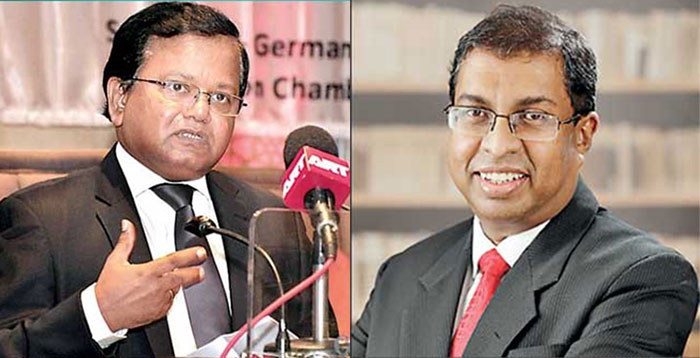Image: Upul Jayasuriya and Saliya Pieris.
(By Shamindra Ferdinando/The Island) Lawyers’ Collective, consisting of some influential members of the legal fraternity, has urged the Bar Association of Sri Lanka (BASL) to take a stand on what it calls President Ranil Wickremesinghe’s continuing efforts to stifle democracy.
The grouping warned that the failure to safeguard the independence of the judiciary, democracy and rule of law and sovereignty now would cause a catastrophe.
The warning was issued at a gathering held at Sri Lanka Foundation on Monday (04) against the backdrop of the Bar Association delaying taking a stand on controversial declarations made by President Wickremesinghe and Speaker Mahinda Yapa Abeywardena as regards the postponed Local Government polls and domestic debt-restructuring in line with the agreement with the International Monetary Fund (IMF).
Former President of the Bar Association Saliya Pieris, PC, declared that they didn’t have the time and space to circumvent the issue at hand while questioning the failure on the part of Bar Association to issue a statement in this regard pending consultations with unnamed senior members.
At the onset of the meeting, former Yahapalana National List MP Dr. Jayampathy Wickremaratne, PC, emphasized why they had to come forward in the face of growing challenge posed by the executive and the Speaker of Parliament.
The LSSP stalwart explained how President Wickremesinghe’s declaration that he would only abide by decisions taken by parliament pertaining to domestic debt-restructuring undermined the very basis of the independence of judiciary.
“The judiciary is responsible for interpreting, defending of country’s constitution and resolving legal disputes, including disputes in which the executive or legislative branch would be involved and their actions would be reviewed. Although the judiciary acts in the name of the State, it is separate from the legislative and executive branches. The judicial branch therefore has to be independent of the government and free from political influence.”
Declaring that the whole country had been disturbed by recent developments, the former lawmaker questioned President Wickremesinghe’s declaration that his government wouldn’t heed ‘orders’ or ‘advice’ from any other party except parliament, an obvious reference to the judiciary with regard to debt-restructuring. The PC also found fault with Speaker Abeywardena for declaring that no court was empowered to issue orders or judgments of any nature against resolutions passed by parliament. “This is palpably wrong,” the constitutional expert declared, adding that no less a person than Justice Weeramanthry, a jurist of international repute held in the late 60s that a parliamentary resolution or regulation approved by parliament was not immune from being reviewed. This ruling was given in respect of Ranbanda vs the River Valley Board, the prominent civil society activist said.
Justice Mark Fernnado, in retirement reiterated Justice Weeramanthry’s position, the ex-MP said, slamming the parliament for threatening to haul up judges of the Supreme Court in terms of the parliamentary privileges act to question over orders given.
Declaring that they re-launched Lawyers’ Collective that spearheaded campaign against the impeachment of Shirani Bandaranayake, CJ 43 during President Mahinda Rajapaksas’s second term to face the new challenge. “We of the Lawyers’ Collective emphasize that the judiciary must not be impeded in any way, directly or indirectly, in reviewing the actions of the government according to the Constitution. We are united by our strong commitment to democracy, the rule of law and the independence of the judiciary.”
Bandaranayake was impeached in January 2013 on charges of financial impropriety and interference in legal cases.
The President’s Counsel vowed that it was their duty to speak on behalf of judges who couldn’t speak for themselves when their independence was threatened.
The gathering was told that Rienzie Arsecularatne, PC, pledged his support to the Lawyers’ Commitment though he couldn’t join the meeting due to sudden illness.
Tamil National Alliance (TNA) lawmaker M.A. Sumanthiran, PC, was among those at the head table. President’s Counsels Upul Jayasuriya and Saliya Pieris launched scathing attacks on the Wickremesinghe-Rajapaksa government over what they called rapid deterioration of democracy.
Referring to the Court of Appeal staying 2018 dissolution of parliament and the Supreme Court decision pertaining to Local Government election petition in March this year, Jayasuriya pointed out the absurdity of the position taken by the powers that be. Those who hailed the 2018 ruling found fault with the one pertaining to Local Government polls given by the same judge, Jayasuriya said.
Recalling what he called the significant role played by the Bar Association during the Neville Samarakoon affair and impeachment of Dr. Bandaranayake, Jayasuriya said that they expected the outfit to take up the challenge.
Jayasuriya dismissed the suggestion made at a recent event that the judiciary should act in harmony with the executive and the legislature.
Pointing out that the government disregarded the Supreme Court order given in March this year in respect of Local Government polls petition on the basis it didn’t have the wherewithal to conduct the long overdue election, Jayasuriya asked what would happen if the incumbent government refused to hold next presidential and parliamentary polls.
Saliya Pieris emphasized there was no hidden hand behind the Lawyers’ Collective. Assuring that they didn’t pursue any secret agenda, Pieris recalled the role played by Bar Association at the height of the second JVP-led insurrection. “When the government killed lawyer Wijedasa Liyanaarachchi we boycotted the opening of the new Supreme Court complex to register out protest,” Pieris said, recalling how the BASL during his tenure as its President threw its weight behind the public protest campaign.
The speakers asked the legal fraternity, particularly the young layers to rally around the Lawyers’ Collective to overcome daunting challenges posed by authoritarian rule. Appealing for unity against those who flouted the law, Pieris emphasized that what the country was experiencing was not only an economic issue but a crisis of governance.
